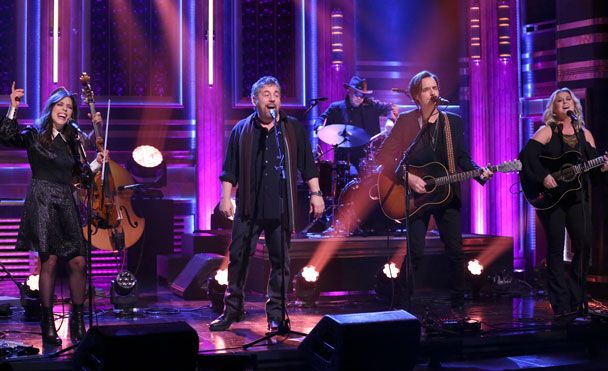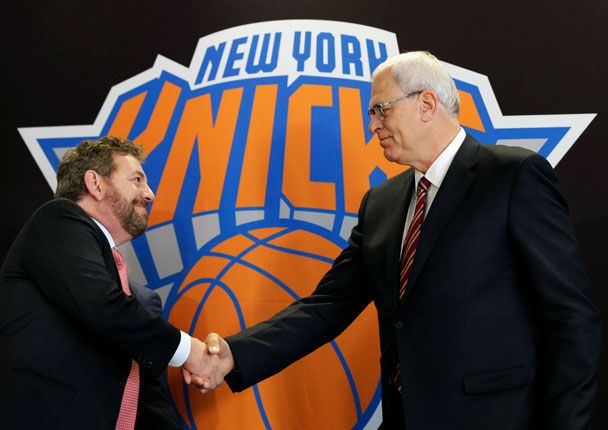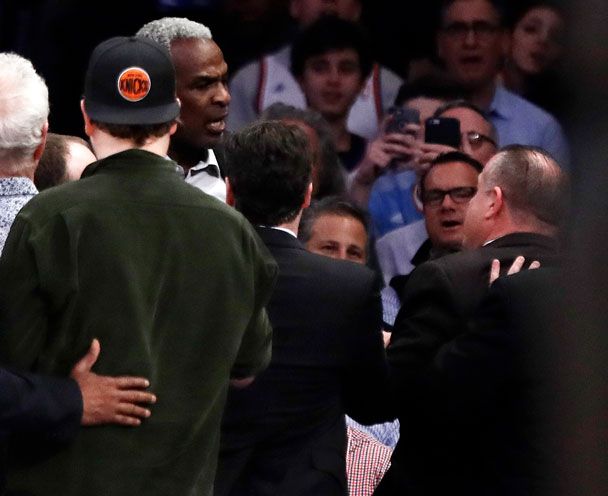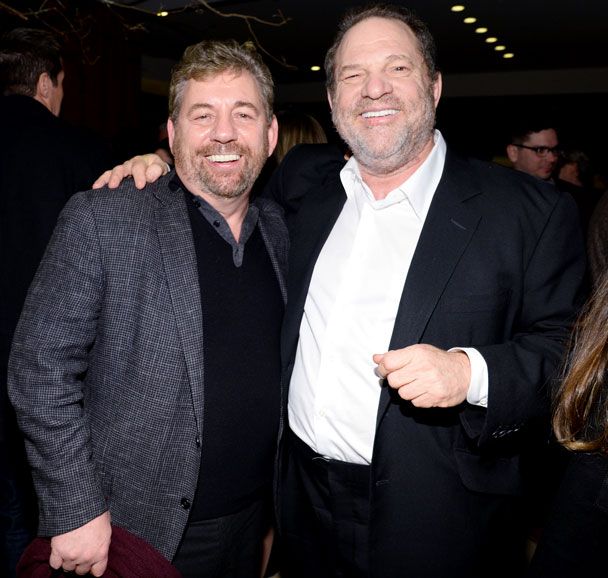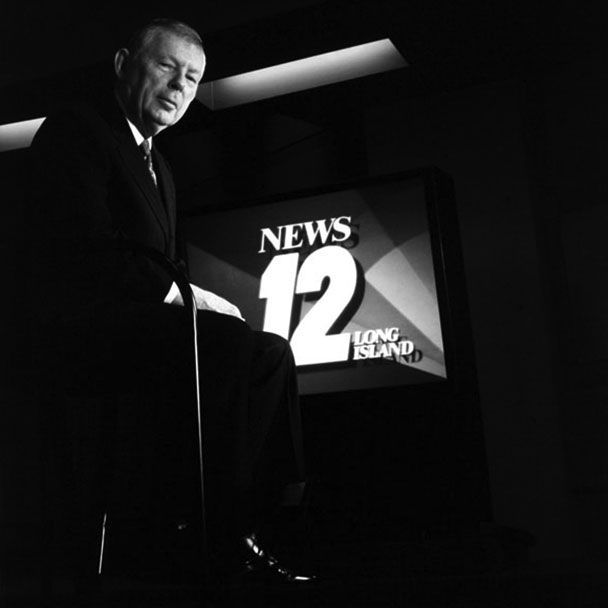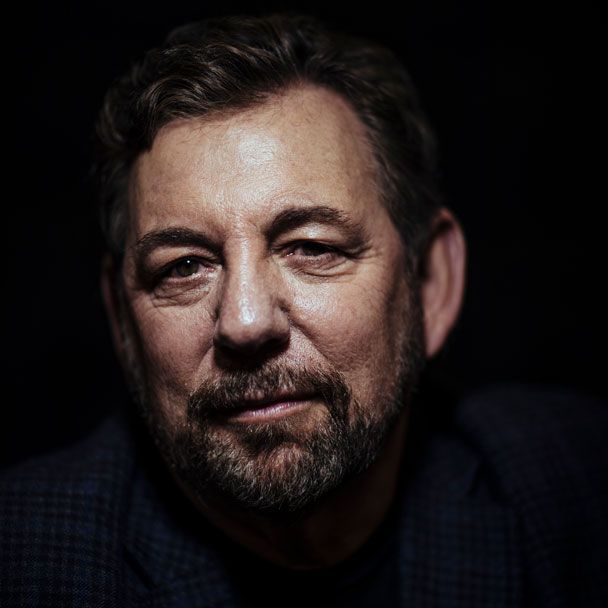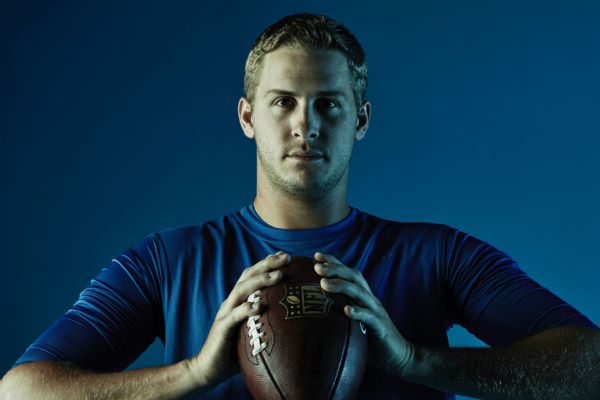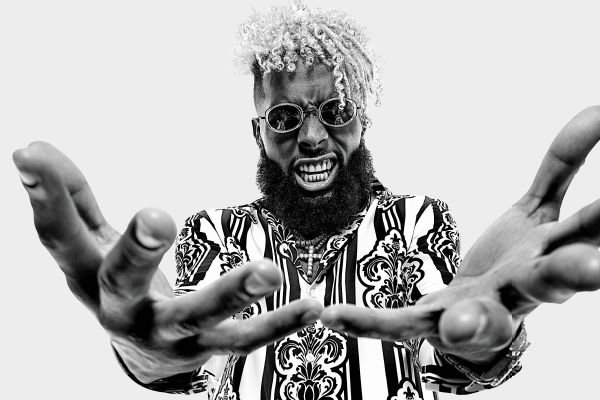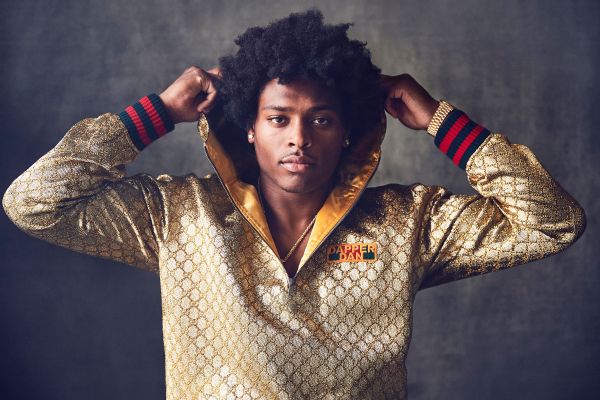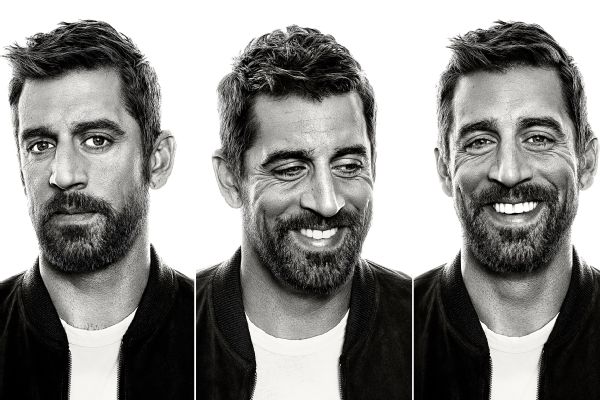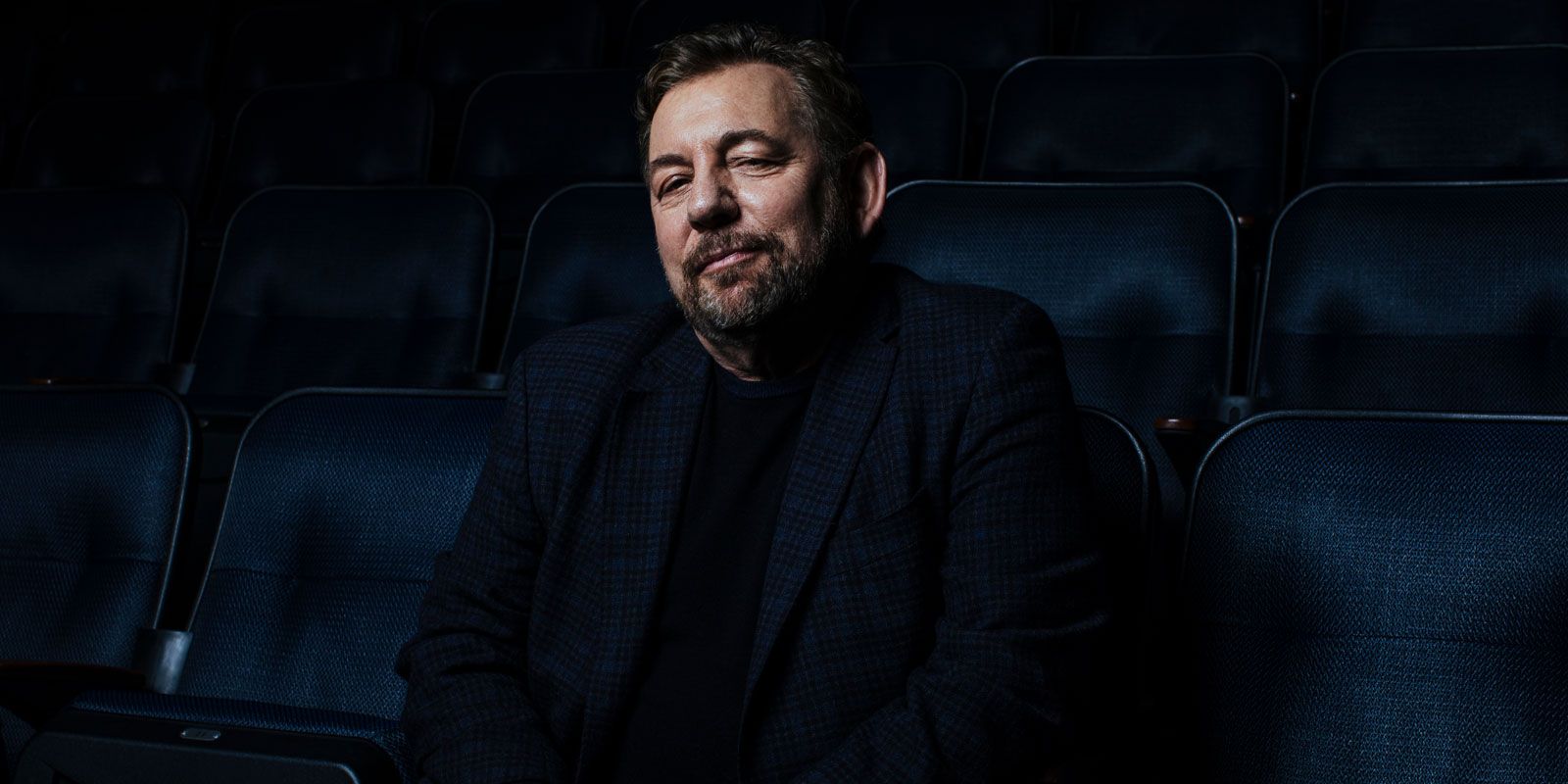
James Dolan, Unplugged
For two stormy decades, New York's most famous sports enigma has lorded over the Knicks, the Rangers and Madison Square Garden without apology.
NEW YORK -- James Dolan is dressed in black as he sinks into his couch in a Madison Square Garden suite, drags on a vape pen and laughs at the booming sound check next door that is all but violently shaking the room. Justin Timberlake is just warming up, and so, it turns out, is Dolan, who is about to commit two hours to an examination -- his critics might call it an autopsy -- of his two decades as the most powerful and polarizing sports figure in the world's most talked-about town. Bruised vocal cords would actually prevent JT from performing on this night, not that JD, the bandleader of JD & The Straight Shot, planned to stay for the show. Dolan is engaged in too many projects and conflicts on too many fronts to count, and on this hectic day, he stays busy in a rare interview by switching from offense to defense and back again, a transition his New York Knicks have failed to figure out for the better part of 17 years. Even though he stands only 5-foot-6, Dolan, 63, fancies himself a fighter and has the scars to prove it. He has taken on all comers, sometimes foolishly, yet always leading with his chin and an unbending belief that he is doing right by his family, his employees and his shareholders, not necessarily in that order. New Yorkers usually love fighters, but wouldn't you know it, it's damn near impossible to find any who love this one. Dolan is not primarily known for his series of sports- and entertainment-business successes, including league-best franchise valuations for the NBA's New York Knicks ($3.6 billion, according to Forbes research) and NHL's New York Rangers ($1.55 billion), or for the 129 postseason games his Rangers played over a dozen seasons, before they wrote their fans in February with plans to rebuild. Dolan is best known as the overlord of the Knicks' never-ending futility and as the master of public relations disasters stretching from the lost 2007 courtroom battle to a female executive named Anucha Browne Sanders, ruled the victim of a hostile work environment, to the 2017 scene of beloved former Knick Charles Oakley being hauled out of the Garden by Dolan's security team before he was arrested and cuffed. The son of cable industry icon Charles Dolan, Jim Dolan, a father of six boys from two marriages, has been painted as a grown-up rich kid with a volcanic temper and a born-on-third-base makeup, and as a hapless owner whose clashes with the media suggest he's more concerned with controlling negative commentary than he is with fixing the problems that encourage it. But there's more to Dolan than the caricature he has helped create. Even former officials who left him under unfriendly terms laud his Garden of Dreams charity for children in need, describe his hunt for a cure for pancreatic cancer as genuinely relentless and concede that his staying power as a big player in the big city has as much to do with his ability to outfox corporate rivals -- he sold Cablevision to Altice for $17.7 billion in 2015, then watched the share price of Altice drop like the Knicks in the Eastern Conference standings -- as it does his bloodlines. On the other hand, one former Garden executive maintains that Jim Dolan would've been fired many times over had someone other than his father been in charge. Told of this assessment, Dolan recoils from the thought and mentions longtime investors who say they've bet their money on a wonderful company. "You don't get fired for doing that, for making everybody wealthy," Dolan says. "And to sit there and suggest it's because of my dad, that's somebody who's forgiving their own shortcomings. ... I'm in the position I'm in partially because that's the family I was born into, and the opportunity was there and I took it. At the same time, just opportunity doesn't get you there. You've got to do something with it, and I think I've done something with it." But Dolan isn't lifting his raspy voice above Timberlake's bruised vocal cords on this day to merely throw shareholder satisfaction at fan despair in a vain attempt to balance his public standing. He is sitting before trays of cookies and cups of popcorn in a suite that won't ultimately be used for a show that won't ultimately happen to answer for everything good and bad about his leadership while one of his senior VPs takes notes to back up her rolling tape recorder. Dolan monitors everyone in the Garden, including Dolan, though he speaks candidly, as if his words would be kept among the three people in the room. The executive chairman is here to talk about whether he might someday sell the Knicks (he certainly didn't rule it out), about Phil Jackson's doomed obsession with the triangle offense and about why he probably won't take part in the parade if the Knicks ever win it all for the first time since 1973. He is here to talk about why he ended his friendship with Harvey Weinstein before the film producer was accused of sexual misconduct by scores of women and later arrested on rape charges, and why he wrote a song, "I Should've Known" -- inspired by the guilt he felt in failing to stop Weinstein and other #MeToo perps -- that invited a review of the Browne Sanders verdict and led to Dolan's latest war with a media outlet. Dolan is here to answer claims that he has run the Garden with an explosive, Steinbrenneresque impetuosity, and to explain why he's devoting more time and energy to his growing entertainment empire, including the futuristic domes (known as Spheres) he's building in Las Vegas and London, than to his under-construction basketball and hockey teams. Dolan is here to say that he wants to retreat into the background, that he sometimes books music gigs in Europe "just because no one knows me" overseas. But as much as anything, Dolan is here to say that he will keep punching back when he feels he has been unfairly attacked, and that he will do so with the same competitive ferocity he needed long ago to start winning the most important fight of his life. "I was close to killing myself with drugs and alcohol," Dolan says. With 25 years of sobriety behind him, the billionaire described by some New Yorkers as the worst owner in a post-Donald Sterling NBA does not merely see himself as a survivor. No matter what the standings say, he sees himself as a winner. Is Jim Dolan right, or is he delusional? Before you pass final judgment, you need to know a bit more about the man and his journey and the people who have helped shape both. James Dolan serves as frontman for JD & The Straight Shot, a blues-rock band that performed last spring on "The Tonight Show Starring Jimmy Fallon." Andrew Lipovsky/NBC/NBCU Photo Bank/Getty Images Like many Long Island teenagers at the time, Jimmy wanted to be Joe Namath in white cleats and a fur coat. He read a magazine profile of the Jets quarterback that included photos of animal skins in the quarterback's apartment and asked his mother whether he could decorate his room the same way. Helen Dolan bought some faux giraffe skins, and her son was one happy little Jets fan. Later, Jimmy decided he wanted to be a guitarist just like the late Duane Allman, who died in a motorcycle crash in 1971. Helen and Chuck Dolan were hardly fans of their son's musical ambitions, and were relieved when he temporarily ditched his guitar at SUNY New Paltz -- after a semester at Boston University ("I wasn't ready for college," Dolan says) and some summer school courses at C.W. Post -- to study business and communications and map out a career in his dad's company. Born in Cleveland, Chuck arrived in New York in the 1950s "originally penniless," according to his oldest of six children, Patrick, who marveled over the fact that the family patriarch "created an empire worth tens of billions." Chuck was the visionary who first wired Manhattan for cable TV and who founded HBO. He hired his youngest of three boys, Jim, to run a sports radio station, WKNR in Cleveland, but Jim's early rise in the Dolan dynasty was nearly extinguished by his alcoholism and his abuse of cocaine and pot that forced him into treatment at the Hazelden clinic in Center City, Minnesota, in 1993. Jim had taken his first drink at age 14. "There's a lot of s--- you don't remember as an alcoholic," he responds when asked to cite his lowest moment. Dolan says family members and close friends ultimately intervened and told him he needed help. "I do remember that my family was compromised, that I felt I was not being a great dad," he says. "And that probably is, if you want to call [it] the low point, that's the disease. That's the whole thing." Dolan is asked whether he identified a root cause of his disease at Hazelden. "Ahhh," he responds, "that's a trap people fall into. You can't do that in recovery. ... You never blame your alcoholism and your disease on anybody or anything. You just take responsibility for it, and you treat it, and that's the life you lead because as soon as you go down that road of saying, 'It's not my disease anymore,' that's a very insidious disease. It will come back and get you." It didn't come back to get Dolan, who was named CEO of Cablevision in 1995. Why was Jim the chosen one among the six siblings, especially so soon after his rehab? "Mostly," New York magazine once quoted Chuck as saying, "it was because no one else wanted it." Jim's supporters say Chuck had more faith in his son than that. This was two years before the company purchased full control of the Garden from partner ITT and four years before Jim's love of sports and content made him the choice to run the building after the death of a trusted Chuck Dolan executive, Marc Lustgarten. Even as his hockey and basketball teams were floundering, Dolan proved himself a worthy adversary for big-city foes in 2005, when he defeated Mayor Michael Bloomberg's bid to build a West Side stadium for the Jets and New York's 2012 Summer Olympics hopes, and when he defeated the smartest businessman he had ever met -- his old man. Chuck, said one former Garden executive, "comes across as an eighth-grade science teacher. But when it came to business, Chuck ate your heart out." Yet Jim says he saw himself as "probably a little more of a street fighter" than his father, more along the lines of Chuck's rough-and-tumble associates, Lustgarten and John Tatta. (Chuck, 92, was not made available for this story.) When the Dolans battled over the Cablevision satellite venture known as Voom -- Chuck wanted to keep it, Jim wanted to ditch it -- the consequences were personal. "It was painful for the whole family," Patrick says. "We're Dolans. We're a bunch of stubborn Irish. They had it out. ... As horrible as that was, it blew over." Nonetheless, by persuading enough board members to vote against his father's wishes and force a sale, Jim had announced his declaration of independence and proved that he, too, had some game in the boardroom. "I suppose that Dad did not expect me to be as independent as I was," Jim recalls. "A lot of people didn't." Was his a Pyrrhic victory? Did Jim's Voom triumph over the great Chuck Dolan embolden him to meet every challenge to his authority with a forceful response and to ignore advisers who counseled him to pick and choose his spots? These were natural questions to ask after Jim Dolan made the worst call of his MSG career -- his decision to allow a sexual harassment case to go to trial. Rather than settle a case that begged to be settled, Jim took a lost cause to federal court in Manhattan, where a jury in 2007 awarded Anucha Browne Sanders, now a UNICEF USA executive who goes by Anucha Browne, $6 million as the victim of a hostile environment created by then-Knicks president Isiah Thomas and another $5.6 million as the victim of Dolan's retaliatory decision to fire her for making the claims. (The parties later settled for $11.5 million.) More than any defeat on the court or on the ice, that case and its unseemly revelations remained attached to Dolan over the years and severely compromised his brand and any attempt to earn the public's benefit of the doubt in future disputes. Asked whether he has any regrets about his handling of the case, Dolan still clings to his oft-stated position that the jury got it wrong. "I think we didn't defend ourselves well," he says, "so shame on us. ... If I had to do it again, I'd be much more careful about how we defended ourselves. I'd be much more involved about it. I'd make sure that the truth came out, and the truth didn't come out. People told me when you're in these kind of trials that it's stacked against you, as being the big employer versus, particularly, a minority woman. ... The second mistake we made was that, even in defending yourself, you might come to the conclusion that there was no way to win the case, and so settle and get the thing out of the papers. That would've been probably a better decision then, too. So both decisions were probably not good, and I'm the guy in charge, so I have to take responsibility for them." (Browne's attorney, Anne Vladeck, responded to Dolan's comments by telling ESPN.com: "The truth did come out. And I think the deck is stacked against an individual when you have a billionaire on the other side. ... It seems it's absolutely [Dolan's] style to blame everybody but himself, and the fact is he had somebody who really took him on in a way nobody ever has before like Anucha did, and I think he has to make up all kinds of excuses for why it didn't work out for him.") Dolan brought on Phil Jackson as president of the New York Knicks in 2014. They agreed to part ways after three years. Richard Drew/AP Photo Yes, Jim Dolan has been the guy in charge of the Garden for nearly 20 years, and over that time, he has said precious little about the controversial choices, antagonistic media relations approach and volatile management style that have shaped perception about him as an owner. Sports fans need to hear his voice, and suddenly, if only temporarily, Dolan feels the need for something other than his singing voice to be heard. This is his opportunity to address the men and women who root for his teams but not for him. This is his time to talk about some of the pressing issues and choices that have defined his chaotic reign. On Phil Jackson's failure as Knicks president: "Look, when I brought on Phil, the big question is, 'Are you going to stay out of it?' And I swore I would stay out of it, and I did. I stayed out of it. And it wasn't until the very end that I had to make a decision that it clearly wasn't working. I think Phil knew it, too. I think he hoped I would have more stamina, but I didn't. ... I think it was much more about this triangle thing. It was much more about his philosophy, that he couldn't get the group to buy into it. And I think he got yessed a lot. I think they'd be underneath their breath going, 'This is not a great idea,' and he got into conflict with some players over it. But I think he tried hard to get his system in. I just don't think he ever got it in." On spinning off the Knicks and Rangers into a company separate from his entertainment properties, fueling speculation Dolan might sell the teams: "The teams are very valuable assets, and they get more valuable every year. I think that will continue to go on. But as a business, you're not killing anybody with your growth. It's single-digit growth. There's really not any way to get it to go beyond that. ... But it's still a good asset. It's better than putting your money in the bank. ... I can tell you that nobody in my family wants to sell the Knicks and Rangers. It's not just my dad. It's the whole family. It's my [five] brothers and sisters. They like being owners ... and they just have no appetite for running the team. That's a different animal. I don't have any appetite for running the team, either one of them. That's not my expertise." On the notion he seems more willing than his family to consider selling his teams: "I love the Knicks and Rangers, right, but you still have a responsibility to your shareholders. They're not there because they're fans. You don't invest hundreds of millions of dollars in a stock because you're a fan. You do it because you think that the business is going to increase in value, that the stock price is going to go up. You have a responsibility as the guy who runs the place to deliver on that for them, that's being open and transparent. And so in that position, I could never say that I wouldn't consider selling the Knicks. Now, my family is not in that position, and they are the majority shareholders. They hold the majority of the vote. ... As a majority owner, I don't want to sell, either. As the head of the public company, you can't say you can't sell, because then you're telling your shareholders that your own personal feelings about your assets are more important than their money. And they won't invest with you if you do that." On the belief among some high-ranking league executives that he has fielded offers upward of $5 billion for the Knicks: "No one has come through with a bona fide offer. You hear numbers all the time. ... I think people have sent feelers out, but never any that were pursued. Yeah, [the feelers are] around that number [$5 billion], but those things, it's like a stock price. It's only important if you're going to buy or sell." On why he became less involved in Knicks decisions after failing to find the front-office stability embodied by Rangers president Glen Sather: "I think the Knicks franchise is somewhat burdened by its history. Everybody is still waiting for Dave DeBusschere to come [as a player]. ... I was searching to get out of the job. ... I wasn't the general manager, and I wasn't the president. I was the guy still in the position I'm in now. I was still approving deals, and I got more involved than I certainly am now. But the more you get involved, you start to learn what you don't know. I became convinced that I didn't think I could add anything to it, and so when the opportunity to bring Phil came in, I was like, 'Perfect.'" On why he's selling the WNBA's Liberty: "I don't know how to be successful with the Liberty. We've always tried to be helpful with the league, and I believe in the Liberty product. If you go to a Liberty game, they're fun basketball games to go to. But I'll be damned if I know how to get people to go to those games. ... We've pumped tons of marketing dollars, we've done everything we can to make the team successful, and people don't come. I think it's the time of year and the perception that the sport is not as good as the NBA." On his three primary Knicks decision-makers (president Steve Mills, general manager Scott Perry and head coach David Fizdale) and his strong record of hiring African-American basketball executives: "When we hired Fiz, Steve came up to me and he says, 'How do you feel about having an all-black front office?' I'm like, 'We do?' I didn't realize we did. I don't think that way. I think about how to get the work done, who's the best person to do the job. We have a lot of women who work in our company who are in very senior positions. That's not because I'm trying to hire women. I think that's because women are overlooked, and so therefore if you're looking for the best person, the odds are stacked in favor of finding a woman for the job because the men are oversubscribed to and the women are undersubscribed to, and so therefore you get a better executive when you're looking at women." On his support of President Donald Trump: "I've known him for a long time. I got married at Mar-a-Lago. I'm a member of Mar-a-Lago, and I support him as a friend. And you don't have to agree with everything that he's doing in order to support him. And he's, by the way, our president, and I don't understand people who wish our president to do badly. Why would you wish your president to do badly? It's like wishing that your milkman will bring you sour milk." On Harvey Weinstein and the lawsuit filed by six women who allege they were assaulted by the filmmaker and who claim Dolan, a former Weinstein Company board member, knew about his predatory conduct: "That lawsuit, they reached out for everybody that they could possibly find. ... I'll answer what the court needs answered from me on it, but I just think it's ridiculous. One of the things that people don't know about Harvey and I is that, long before this ever happened, a year before this ever happened, I stopped relating to Harvey. I stopped being his friend because he had changed, and he wasn't behaving like my friend. He was behaving like somebody -- it was what I could do for him. In fact, I wrote him a whole letter about it and he never responded to it, until the next time I heard from him like six weeks later, and it was a request for tickets. And I'm like, 'I know you read my letter.' But I gave up on him long before that." On whether he could have avoided ejecting and banning Charles Oakley from the Garden for shouting obscenities at security during the Knicks-Clippers game on Feb. 8, 2017: "He was out of control. Anybody else who went even half the way that he went would have been ejected from the venue. It just got too bad. He had to be taken out." On whether he would have approved the rehiring of Jeff Van Gundy, who quit the Knicks early in the 2001-02 season and who recently told ESPN.com, "Yes, I wanted to speak to them. I wanted the Knicks job, but you can't argue with who they hired. I think David Fizdale is an outstanding coach.": "I never heard that. He wanted the job? Look, I'll do whatever's necessary to help the team. If Scott and Steve said Jeff's the right guy, fine, but it was really their call. I didn't meet anybody else other than Fiz. They said, 'Look, he's our pick, I want you to meet him.' So I did. I wasn't involved in the selection process at all." On his vision of a Knicks championship parade: "I don't have a vision of a Knicks parade. ... I always [said] I wouldn't go on the parade because I didn't win the championship, the players did. I don't relish the spotlight with being the owner of the team. If we did a parade, I don't know if I'd go on the parade. I don't think I would." On singing a song for Deadspin that describes owning the Knicks as "a living hell" for a trust fund kid like himself: "It's not a living hell. I have to say, I enjoy the summers. The city, fortunately for us, is very focused on its teams. But when things aren't going well, there's a pecking order. First it's the players, then it's the coaches, then it's the general manager, then it's the owner. And there's no satisfaction to be had anywhere along that line for people who are unhappy about losing, so you hear it. I don't relish in the focus that's put on me. I'm all about the work, so yeah, I don't really love that part of it at all. "To be honest, we won the first game this season at home. It was great, and I'm walking out of the building ... and people are yelling at me, and they're actually yelling nice things. ... I'm like, 'Oh god.' It's not something that I really enjoy either way. ... I'm not hiding, I just want to be me. In New York, I really can't go out in public without having a security person with me, and I'm hearing stuff and it's like, 'Hey, I'm just shopping here.' A lot of times people are nice. 'Hi, how are you doing? Are we going to get this guy? Is this going to happen?' I try to be nice to them, [but] usually people have negative things to say. ... They like to jump out, shout something horrible and run away. That happens all the time. Even at dinner. It's not fun." Al Bello/Getty Images for ESPN Is it fun to work under Jim Dolan inside the self-anointed world's most famous arena? Stories of Dolan verbally demolishing subordinates over the years are legendary, and he has threatened the job of at least one security employee who stopped him in the Garden after failing to recognize him. Dolan also fired his security chief in the wake of the Oakley fiasco. Sometimes, Dolan says, "you have to wake up your group." One former executive who praises Dolan's willingness to spend on his teams also says the Garden's executive chairman had created "a culture of fear in the building" that left employees on edge, uncertain of what they will encounter from one day to the next. Dolan contends that diligent and productive workers have nothing to fear on his watch. "But if you're hiding in the shadows, and you're just hoping that people don't notice that you're not working," he says, "then you could be afraid, yes." On the topic of Garden culture, this much is clear: Media paranoia is an indisputable part of the building's playbook. Years ago, Dolan considered trying to ban reporters he felt had been unfair in their coverage, and Garden officials advised team personnel against speaking to credentialed writers deemed too critical. Dolan put in place media-training sessions for employees (Latrell Sprewell and Marcus Camby fell into disfavor after walking out on one), an expectation that MSG Network announcers wouldn't harshly criticize the home teams -- which led to the dumping of broadcasting legend Marv Albert -- and a policy that prohibited personnel from conducting interviews without a media relations official present. (Dolan once broke up a casual conversation former GM Glen Grunwald was having with a columnist outside the Knicks' locker room because the conversation, in his words that night, "hasn't been approved.") Today, Dolan confirms that his PR department does keep clip-file dossiers on those who cover the Garden and its teams. He says he'd recommend the same to all CEOs, so that they don't unwittingly invite any foxes into their billion-dollar henhouses. For this story, a Garden official listened in on all interviews conducted with the Dolan executives and associates who were made available to comment on the record. "But what people don't realize about Jim is that he's actually a major defender of the First Amendment," maintains his brother Patrick, owner of the Long Island newspaper Newsday and former president of the TV station News 12. "And I can tell you that because I ran News 12 for 27 years, and during that time we ticked off a lot of very powerful people, all the way to the governor's office. Some of those people were very important to the company, and not once did I ever feel the slightest pressure from Jim to alter or delete or slant our coverage, although he was in a position to do that. ... He always, always had News 12's back." This is the Dolan dichotomy. Bad Jim is the owner who can be his own worst enemy, the contrarian who too often subscribes to the notion that whenever everyone in the room tells him he is wrong, that's when he knows he is right. (Dolan denies ever overruling a roomful of executives who unanimously agreed to paint the Garden roof black merely because he preferred to see a brown roof from his 26th-floor office overlooking it.) Bad Jim is the owner who once battled the Yankees and denied fans televised games as a casualty of unnecessary cable squabbles, and who inspired some Garden officials to wish his father would rein him in. Bad Jim is the owner some believe dearly misses the wisdom and guidance of Marc Lustgarten, who died of pancreatic cancer in 1999 (stirring Dolan's all-out support of the Lustgarten Foundation, which has directed $165 million to pancreatic cancer research) and who knew how to play away from Dolan's weaknesses. Bad Jim is the owner who years ago, on occasion, would play his guitar on the Knicks' team plane -- even after losses, according to several witnesses. "It was the last thing the players and coaches wanted to hear," says one regular on those flights. "I just remember the looks on their faces." (Dolan denies this claim and calls it "somebody's fantasy.") Former Knicks forward Charles Oakley was escorted out of the Garden during the Knicks-Clippers game on Feb. 8, 2017. Frank Franklin II/AP Photo Bad Jim receives an angry email from a Knicks fan of more than 60 years and responds with an angrier email calling the man a "hateful mess," suggesting he might be an alcoholic, and ordering him to start rooting for the Nets, according to Deadspin. Bad Jim responds to a heckler who was holding a beer while shouting at him to sell the team by confronting the man, berating him and accusing him of being drunk. "People who come out of the blue, they don't know you, they don't know anything about you, and send a hateful tirade at you," Dolan says today. "I mean, who does that?" A Good Jim would not return fire like this, of course, though his friends and top officials swear that a Good Jim does indeed exist and represents the owner's more dominant day-to-day personality. Good Jim organizes the benefit concerts for victims of the 9/11 attacks, Hurricane Katrina and Hurricane Sandy. Good Jim adds $100,000 to his previous financial support of Carmelo Anthony's relief efforts for hurricane victims in Puerto Rico -- on the day the Knicks traded Melo to Oklahoma City, to show, Dolan says, "that the company actually really did care about what he was doing with charity work, and that it wasn't about trying to make the relationship better with him." Good Jim arranges and regularly attends annual Christmas Day events to feed thousands of homeless New Yorkers, and donates tens of thousands to the college funds of children of an employee's relative who died young, and offers his plane to Tyson Chandler to fly back and forth across the country after Knicks games -- during the center's time in New York -- to visit his mother, who had been diagnosed with Stage 4 colon cancer. "Even before that I thought highly of Jim," says Chandler, now a member of the Lakers, "because he always ... went above and beyond for his players in trying to make sure his players are comfortable. ... I will forever respect and love him and appreciate him for what he did for me and my family in that moment, because that was the worst time in my career." Good Jim speaks passionately to a group of recovering alcoholics, sharing his hopes and fears and experience with the disease, rather than attend a Rangers playoff victory over Montreal. Good Jim helps an executive's family member who is fighting addiction. Good Jim gives Glen Sather his 10-year sobriety chip -- at a bygone time when many were calling for Sather's job -- because, Dolan says, "it represented faith and hope and belief, and I wanted him to know that I had all those things in him." (Sather says he still carries that chip in his money clip every day.) Good Jim charges Steve Mills to consider female candidates for the Knicks' head-coaching job and, according to NBA commissioner Adam Silver, often uses league meetings to raise the need for teams to give opportunities to women and people of color. "There's no ceiling," says Dolan's highest-ranking female executive at MSG, retiring Executive VP and CFO Donna Coleman, who describes the organizational culture -- almost 13 years after Browne Sanders was unjustly fired -- as a "very safe, fair environment for women. ... [Dolan] has given me opportunities I don't know if I would have gotten anyplace else." Another high-ranking female executive, Sandra Kapell, oversees a Garden program Dolan first installed at Cablevision that's designed to enhance the employees' benefits and workplace experience, increase rewards and recognition for good job performance, and, perhaps, attack the external perception that the chairman rules with a cold and punitive hand. Dolan says his mission is to ensure his employees "want to be here and they want to stay here, because when you get employees that want to be here and want to stay here ... they get better at their jobs and you don't have to hire somebody else." But as soon as the narrative that Dolan has mellowed a bit takes shape, he ends up in his steel-cage match with Oakley, who filed a lawsuit against Dolan and MSG for, among other things, defamation, after the Knicks released a statement saying they hoped the former power forward "gets some help soon" and after their owner advanced an inexcusable pattern by telling ESPN Radio's "The Michael Kay Show" that Oakley "may have a problem with alcohol." The court has yet to rule on an MSG motion to dismiss the defamation suit. "We are confident that when a jury sees the video evidence," Oakley attorneys Douglas Wigdor and Renan Varghese of Wigdor LLP said in a statement to ESPN.com, "they will recognize that it was Dolan's behavior that precipitated the unwarranted assault on Mr. Oakley." Dolan also ends up singing a song about sexual predators that compels an emerging sports radio voice, Maggie Gray of WFAN, to call him a hypocrite, a "vile piece of trash" and a "disgusting human" for presiding over his own harassment scandal and for bringing back Thomas, of all people, to run a women's basketball team, the Liberty. "She went way the hell over the line," says Dolan, who adds that he waited and waited for an apologetic and reassuring phone call that never came. On cue, after station representatives later requested Garden talent for an appearance, along with an MSG contribution for a charity event, Dolan went to DEFCON 1 and banned his employees from doing any business with WFAN and other stations run by its parent company, Entercom, as first reported by The New York Post. (Dolan later made the contribution directly to the affected charity.) "Imagine yourself in your neighborhood," says Dolan, who keeps homes in the city and on the Long Island waterfront, "and your neighbor two doors down, who comes to picnics, all of a sudden does something like Maggie's rant and totally trashes you to the entire neighborhood. And then shows up two months later and says, 'Hey, can I borrow that socket wrench set that you have?' What would you do with that? ... I don't find it noble to sit there and take an attack like that, but it has to be really over the line. "If you don't have a tough skin, you're never going to survive. But at the same time ... you have to feel good about yourself. And if you don't stand up for yourself, how are you going to do that?" Dolan and Harvey Weinstein, at a party on Dec. 15, 2014, in New York City, were friends for many years. Dolan later ended the friendship with the disgraced movie producer and wrote a song titled "I Should've Known." Clint Spaulding/Patrick McMullan/Getty Images David Stern once observed that Jim Dolan's Knicks were "not a model of intelligent management." Stern's protégé and successor, Adam Silver, deflects a recent question about whether he feels differently. The commissioner did say that Dolan's stature has grown among his peers, that Jim serves on a number of impactful league committees and that his expertise in the media business is unrivaled. Silver also says that, more than any other owner, Dolan uses data and sound business principles instead of emotion in difficult negotiations, and that he forever calls the league office as an invested advocate of the Knicks. What would Silver tell an inquiring NBA player about Dolan? "I'd say he's incredibly passionate and he's also incredibly loyal," the commissioner says. "And that's what you can expect with him. He will be very direct with you, and he will pull no punches." Silver would like Knicks fans to understand that Dolan suffers as horribly as they do. "I can't imagine any owner who's lost more sleep over the last two decades regarding a sports team than Jim has," Silver says. Everyone close to Jim swears the same thing. The men who run his three teams, Mills and Sather and Thomas, and Garden president Andrew Lustgarten (Marc's son) talk about how badly the owner wants to win for his paying customers. Barry Watkins, a longtime Dolan aide who recently started Clairvoyant, a media-training company, calls the notion that his former employer doesn't care about his fan base "the most ludicrous premise of all things about Jim Dolan." Van Gundy, the former Knick, calls Dolan "an absolute home run" when it comes to caring and committing resources to his teams. Wayne Gretzky, a former Ranger, says he believes Dolan wants to win "as badly as any athlete on his payroll." Gretzky says if given the choice, the owner would pick a title with his basketball team over one with his hockey team. "It would make his life complete if he could win a Knicks championship," Gretzky says. Dolan already has a number of trophies on his shelf. He put a billion dollars into a Garden renovation met with widespread approval, and the president he forced out in 2001, Dave Checketts, doubts that any other NBA owner would have made that kind of staggering investment. Dolan's partnership with music mogul Irving Azoff produced a stunning transformation of the Forum in Los Angeles, and gifted Dolan's band a chance to open for The Eagles (though it also delivered Phil Jackson, an Azoff friend, to the Knicks). Radio City Music Hall, the Chicago Theatre, the Beacon Theatre and a spinoff of the MSG Network, along with investments in the TAO Group, Tribeca Film Festival and Boston Calling Music Festival represent a long list of successful purchases and moves that erase earlier mistakes Dolan has made in acquiring the Wiz and Clearview Cinemas chains. As part of his growth strategy, the Garden chairman now wants to add to the Sphere venues going up in Vegas and London; he hoped to build one on the West Side of Manhattan before running into a brick wall of bureaucracy. "He's trying to disrupt an industry," Lustgarten says of the state-of-the-art venues, "that hasn't changed since the Greeks and Romans." Brandon Ross, an analyst for BTIG, says Dolan is effectively betting his legacy on something other than the Rangers and Knicks. "He sees something in the entertainment world that he can change and be remembered for," Ross says. But to the New York sports fan, Dolan's entertainment vision and boardroom victories are worth less than the cost of a hot dog and a beer. "Nothing is for free in New York City," says Mark Messier, the only captain to deliver a title to the Garden over the past 45 years. "And that goes for an athlete or an owner or a coach or anyone else. ... I think at some point, if Jim wins a championship, his generosity and the way he's given the resources to his teams will be more loudly applauded. Jim's giveback is incredible, and your outreach into the community is a big part of owning a franchise. But in the end, we are all judged on whether we win or not. And Jim is no different." Dolan's father, Charles Dolan, founded Cablevision and went on to become a cable industry magnate. Catrina Genovese/Getty Images In an attempt to paint a hopeful portrait of Dolan's future, Silver points out that Golden State Warriors owner Joe Lacob was booed off his own floor in 2012, and now -- after winning three championships with Steve Kerr, the coach the Knicks failed to hire -- is considered one of the best owners in sports. And yet, forever captured by cameras and frozen in the minds of Knicks fans is the unmistakable sight of a defeated Dolan, slumped in his courtside seat. Except for one fleeting run six seasons ago, when they won 54 games and a playoff series, the Knicks haven't been the contending Knicks of the '90s since Dolan ran out Checketts and then ran through a parade of executives -- Scott Layden, Thomas, Donnie Walsh, Grunwald, Mills, Jackson -- in his futile pursuit of a credible contender. Now Dolan is rebuilding yet again, and hoping Kevin Durant or Kyrie Irving will take his money next summer to fast-forward a process that has the Knicks at 9-22 as they await the eventual return of their injured star, Kristaps Porzingis. Meanwhile, facing a long road back to NBA relevance, Dolan remains a magnet for negative headlines. The Federal Trade Commission recently said the MSG chairman violated federal securities law for a second time by missing a deadline to report his acquisition of voting shares in his company; Dolan settled the case at a price of more than $600,000, a bill his law firm, Debevoise & Plimpton, agreed to pay, the Garden said, "as a result of their mistake." Dolan wasn't happy that he took another PR hit for someone else's error but wasn't surprised that he did. That's life in the big city, though he wishes his terms of engagement in New York weren't as nasty -- despite his ever-present willingness to escalate a minor scuffle into nuclear conflict. "There's a change in tone, even in the press," he says. "It's the same things I don't like about being owner of the team." Dolan refers to a more civil climate in his father's prime. "Back then," he says, "people understood you were doing a job. And they didn't necessarily come to these conclusions about your personality, who you are, whether you're an evil person. It's a little unreal today." Nick Laham for ESPN But that doesn't mean Dolan is ready to retire from the fight game. He believes he is ahead on points on the judges' cards, by the way, no matter how often the media portray him as clueless and as the most conspicuous obstacle separating the Knicks from that parade he doesn't plan on attending. Dolan finds solace in the fact that Rangers fans generally are on relatively decent terms with him, and the fact that the investment community doesn't see in him what Knicks fans see. So in the end, is Dolan actually a consistent corporate winner with the misfortune of being known for the one thing he can't fix -- the Knicks? Or is he better described by a 2015 Forbes headline that called him "the dumbest owner in sports"? Dolan commits only so much time to the process of finding out. "All right, the concert's over," he announces as he rises from his couch after outlasting Justin Timberlake's wasted sound check, slamming shut the window on his soul he left open for 2 hours, 3 minutes. He doesn't want to get consumed by his teams, or get distracted from his Spheres, or get stopped on a Manhattan street for the purpose of being ridiculed or praised. In the end, Jim Dolan wants to make his old man proud and his shareholders happy. And after that, he just wants to be left alone. ESPN's Ohm Youngmisuk contributed to this report.